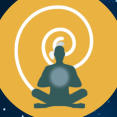





Urban & Wilderness
Vision Quest
People in indigenous societies have always undertaken vision quests. They can
either be part of puberty rites to help a young person find their place in society or
undertaken by adults who need transformation and clarity on personal or
spiritual issues. Especially as we rediscover the natural world, more and more
modern people are appreciating the utility of this ancient practice.
Although vision quests can indeed help resolve something on the intellectual level,
they are mainly done to confront deeper issues which have limited the seeker’s
happiness and fulfillment. Sometimes this involves finding and bonding with a specific inner spiritual
power, or guide. In that case, initiation of some kind occurs on its own during the time interval
involved.
For the best results, vision quests should be pursued with an appropriate sense of the sacred and
ritual boundaries. They are usually done under the guidance of a shaman, mental health professional
or some other teacher or elder, especially if a young people are involved, or if the seeker’s
psychological obstacles are severe.
PRIVATION
Two basic variables are employed in vision quests. The first is privation—doing without the
supportive circumstances of ordinary life. The basic ones are 1) work activities, 2) leisure activities
(including the ability to move around), 3) food, 4) water, and 5) sleep.
The Power Spot. Most modern vision quests only eliminate the first three of these. You go to a quiet,
undistracted place in order to be only with yourself—no books, wristwatches, electronic devices, or
anything. For domestic or for shorter wilderness vision quests, you stay in that place—a circle
perhaps 10 feet in diameter—since walking around would provide distraction. (In order to relieve
one’s self, a specific place is agreed upon for that purpose ahead of time, perhaps 100 feet away.)
Fasting. All religious and mystical traditions practice food and sometimes water deprivation on
certain occasions. Partially because digestion itself requires energy, after the first six or seven hours,
hunger pangs fade and most people experience an unusual, subtle clarity which is conducive to prayer
and introspection. This is what distinguishes a vision quest from simply “time alone,” and invites the
spiritual element. Most people can perform a three- or four-day food fast without difficulty or health
problems.
No Distractions. Sometimes people let themselves have notebooks for journaling, but they often end
up doodling, writing poetry, etc. In that case, the notebook becomes yet another way of not really
having to be with yourself! If the seeker desires to write, play a musical instrument or what have you,
that is not a vision quest in the original sense, but rather a retreat for artistic purposes.
Practically speaking, there are two levels of vision quest privation. The first would be not letting
yourself have anything, as above. The second, for longer vision quests, typically involves the ability to
at least move around, if not also have a journal and maybe small amounts of food. In wilderness
environments, the “walkabout” both relieves tension and sometimes provides the setting for powerful
experiences. Spiritual Connection. Classically, the place you go to do a vision quest is in nature
somewhere, not only because you everyday distractions would be gone, but also to more easily
connect with a deeper sense of meaning and spirituality. The resulting experience tends to be more
profound, having nothing necessarily to do (although it usually does) with the person’s cultural
background, but everything to do with the uniqueness of that individual, with his or her specific path
through life.
PATIENCE
The second variable is patience. Vision quests are done for extended periods of time. This is so that
the seeker’s normal psychological routines and defenses (worries, daydreams, practical problems,
etc.) can exhaust themselves. As a result, sustained self-inquiry begins takes place at deeper
levels. As the hours drag on and your mental routines drop away, new insights invariably
occur, concerning the more meaningful problems and dilemmas of your life.
Intentional Discomforts, Surrender and Faith. A person in reasonably good health may choose
to impose further privations on themselves, and for more extended periods. Not having tarps
or cushions to sit on, being willing to endure rain if nature decides to bring it, avoiding as much sleep
as possible by trying not to lie down—all these are examples of options one might consider. Again, this
is done to further weaken physical and psychological defenses so that a “breakthrough” from within
might occur. Especially important to these added elements of discomfort is an attitude of openness
and acceptance: surrender to whatever God/Fate/Destiny decrees that the seeker should experience.
(Going even further, physical trials might be added on to force the seeker to find internal resources he
or she did not know were there. This is still done during puberty rites in some indigenous
societies. Subjects might have to carry something, swim for a distance, run a gauntlet of
spearpoints, or something similar. Naturally, this always involves supervision and
oversight by a number of teachers or elders who are present at the time.)
Demons and Safety. For most people, being “all alone with my mind” for a long time is challenging only
in the context of boredom. For some however, frightening thoughts and images may present
themselves, to the point where personal safety demands that isolation be terminated. Should this be
the case, a mechanism is always provided for the seeker to contact supportive personnel standing by.

DavidLowMSPhd.com








“Spirituality
is
Reality”
Meditation Techniques
-Mantra, visualization,
movement, methods
-Affirmations
-Meditation Q & A & Instructions
-Vision Quests
Spirituality &
Common Mental
Health Issues
-Adjustments
-Anxiety
-Depression
-Relationships
-Life direction
-Personal views of addiction
-Mindful Recovery








LUCID DREAMING
--WHAT IS IT?
Lucid dreaming occurs when we are aware that
we are dreaming, instead of experiencing
dreams involuntarily, like we usually do. (There
are different degrees of awareness we can have
in dreams, so there’s no exact cut-off point
between lucid and non-lucid (ordinary)
dreaming.)
--WHAT VALUE DOES IT HAVE?
Various authors and ongoing research in lucid
dreaming describe a significant range of
therapeutic and healing benefits associated with
this practice, obviously enhancing our
spiritualities. All personal issues can be worked
out in lucid dreaming. It is often fun, and the
exposure it gives us to higher realities and
divinity, and all the things you can do, see and
feel in those realms, can be educational in the
profoundest sense of the word. As of this writing,
interest in lucid dreaming is exploding, and it is
not just a fad. Many think that a worldwide
spiritual awakening is taking place, and that
lucid dreaming will be a primary venue of
practice which millions of people will eventually
utilize to get closer to and merge with God/Self.
--CAN I VISIT DECEASED RELATIVES, SEE
EXTRATERRESTRIALS, AND HAVE SEX
WITH ANOONE I WANT IN LUCID
DREAMS?
If you attitude, understanding, personal issues,
and dream karma line up, then yes, you can do
all that stuff. Those things will never always
happen exactly like you want them to, however,
because being aware, and trying to do the things
you want to do in the dream worlds, does not
prevent those dream worlds from carrying out
their primary function: helping you grow up and
unfold towards enlightenment. At the pace you
need, you will be presented with things in your
lucid dreams that you have to overcome and
adjust to. What seems to always happen, in fact,
is that at some point, lucid dreamers start
getting guidance from teachers that they meet in
their dreams.
--IS IT EASY TO LEARN?
In general, no—although most everyone can to
some extent. I am convinced that the amount and
depth of lucid dreaming a person does is
determined primarily by inborn spiritual
aptitude, and secondarily by level of interest and
efforts to do it. We all have “inborn spiritual
aptitudes” of one kind or another. Most people
work out their spiritually-related issues in daily
life. Although it usually happens on its own,
there are various induction techniques you can
do to increase the likelihood that it will occur. In
my experience, most people who are into lucid
dreaming first encountered it
spontaneously—one day, it just started
happening by itself, as part of their dream life. In
order to start a lucid dreaming session (bedtime
routine), there are various induction techniques
you can perform, roughly similar to different
types of meditation.
--HOW CAN I GET LUCID DREAMING TO
HAPPEN TO ME, AND HOW CAN I
ENHANCE THE DREAMS I’M HAVING
NOW?
The consensus on this question from
accomplished lucid dreamers is that it’s mostly a
matter of interest and attitude concerning your
more general spirituality. Many people already
qualify in this regard without realizing it. I think
you would have to accept the ideas that 1)
enlightenment exists, 2) that the spiritual path
consists of increasing levels of awareness, 3) that
practices like meditation and yoga help with that
goal, and also 4) that your dreams are worthy of
serious study. If you follow through with those
things, -plus induction techniques, if you want-
your dream life will likely be enriched.
--HOW CAN YOU HELP WITH MY LUCID
DREAMING?
We would work together to get clarity on what
your own understandings and goals are relating
to your dreams and your spirituality, and how to
increase your lucidity in dreams and in your
daily life. This will involve a kind of action plan
reguarding your overall spirituality, maybe
some things in your daily life, and what you
might try to do in the dream worlds. This usually
involves working with at least some problems
and issues in your waking life, because very
often the dreams present (although
symbolically) those issues in an almost-parallel
way so you can discern how to resolve them.




“Spirituality
is
Reality”
SPIRITUAL
COUNSELING
AND INTERFAITH MINISTRY







